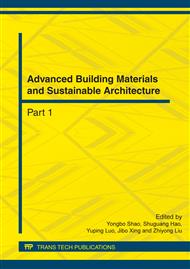[1]
R.A. Easterlin: Does Money Buy Happiness, The Public Interest, (1973)
Google Scholar
[2]
D.S. Kong, C. Li: Discussion of Happiness in Eastern and Western Philosophy, Theoretical Investigation, Vol. 5 (2010), p.16
Google Scholar
[3]
L.S. Stavrianos: A Global History: From Prehistory to the 21st Century (7th Edition), Beijing University Press, Beijing, (2006)
Google Scholar
[4]
L. Wirth: Urbanism as a way of life, Am. J. Sociol, Vol. 44, (1938), p.1
Google Scholar
[5]
C. Fischer: The Urban Experience, Harcourt, Brace Janovich, New York, (1984)
Google Scholar
[6]
S. Milgram: The experience of living in cities, Science Vol. 167, (1970), p.1461
Google Scholar
[7]
H. Lefcourt: Locus of Control, Halsted Press, New York, (1976)
Google Scholar
[8]
R. Barker: Ecological Psychology, Stanford University Press, Stanford, (1968)
Google Scholar
[9]
M. Pacione: Urban Environmental Quality and Human Wellbeing-A Social Geographical Perspective, Landscape and Urban Planning, Vol. 65, (2003), p.19
DOI: 10.1016/s0169-2046(02)00234-7
Google Scholar
[10]
Y.T. Liao: Theoretical and empirical research into the concept of quality of life in urban planning, Annual Conference Paper of China Urban Planning, In Chinese, (2008)
Google Scholar
[11]
B. Giles-Cortil, National Congress-Creative and Sustainable Communities, School of Population Health, UWA, Planning Institute of Australia, Melbourne, (2005)
Google Scholar
[12]
D. McMillan, D. Chavis: Sense of Community: A Definition and Theory, Journal of Community Psychology, Vol. 14, (1986), p.6
Google Scholar
[13]
V.K. Irene, L., Kees, M. Gooitske, D.H. Augustimus: Urban environmental quality and human wellbeing- Towards a conceptual framework and demarcation of concepts; a literature study, Landscape and Urban Planning, Vol. 65, (2003), p.5
Google Scholar
[14]
P. André, D. Bietondo: A conceptual and methodological framework for an integrated approach in linear infrastructure projects, In: Proceedings of the Presentation at the 22nd Annual Meeting of the Interanational Association for Impact Assessment, The Hague, (2002), p.15
Google Scholar
[15]
B.H. Massam: Quality of life: public planning and private living, Progress in Planning, Vol. 58, (2002), p.141
DOI: 10.1016/s0305-9006(02)00023-5
Google Scholar
[16]
C.S. Shafer, B. Koo Lee, S. Turner: A Tale of Three Greenway Trails: User Perceptions Related to Quality of Life, Landscape Urban Planning, Vol, 49, (2000), p.163
DOI: 10.1016/s0169-2046(00)00057-8
Google Scholar
[17]
RIVM, National Outlook, Summary in English, ISBN: Check, (2000)
Google Scholar
[18]
G. Mitchell, A. Namdeo, D. Kay: A New Disease-Burden Method for Estimating the Impact of Outdoor air Quality on human Health, Science, Total Environment, Vol. 246, (2001), p.153
DOI: 10.1016/s0048-9697(99)00455-6
Google Scholar
[19]
Information on http://www.51Labour.com
Google Scholar
[20]
B. Sanyal: Comparative Planning Cultures, Routledge, New York, (2005)
Google Scholar
[21]
Z. Wang: Bridging Urban Planning and Ecology, Landscape and Urban Planning, Vol. 92, (2009), p.348
DOI: 10.1016/j.landurbplan.2009.05.012
Google Scholar
[22]
T.W. Zhang, R. Le Gates: Changing Planning Paradigm in China in the Post Neo-liberalism Era, Urban Planning Forum, In Chinese, Vol. 5, (2009), p.1
Google Scholar


